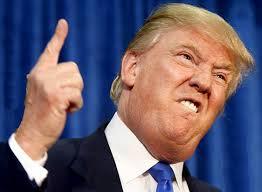
If you wish political talk radio felt as hot today as it did 15 or 20 years ago, take some consolation in the Donald Trump campaign.
It's pretty much the same thing.
When Trump says America should slam its door on all Muslims, that's a guy calling in to a talk radio show. When he says we should kill the families of ISIS fighters, that's a guy calling a talk radio show.
Only difference is, talk radio callers live behind a curtain. No one knows their names, faces or where they live. They can say almost anything, knowing there's no accountability or consequence.
We've now apparently progressed, pardon the term, to the point where you can say that stuff and become a front-runner for a major political party's presidential nomination.
And why not? During arguments at the Supreme Court this week, Associate Justice Antonin Scalia approvingly quoted a brief that suggested black students might be better off at "lesser schools where they do not feel that they're being pushed ahead in classes that are too fast for them."
That sort of remark could only come from one of two places: the 18th century or political talk radio. In Scalia's case, bet on the former. In Trump's, the smart money is on talk radio, because this is a man who knows his contemporary media.
Ironically, political talk radio listenership has fallen sharply over the last few years. In New York, reflecting trends in other markets, political talk stations WABC and WOR have half the audience share they had back in the 1990s and early 2000s.
There are several reasons for this, one being that political talk television and the Internet have poached some of the traditional radio audience.
Another factor is more delicate. John Mainelli, former WABC and WOR program director, has been warning for years that political talk radio squandered much of its original appeal by forgetting that it needs to stay lively and interesting. Instead, he has said, too many hosts obsess on subjects like Benghazi long after all but the most hard-core believers can take it any more.
Whatever the reason, political talk radio still has a place at the media table. Candidates still use the big shows as regular sympathetic forums, a fact underscored by Ted Cruz's suggestion a few weeks back that a Republican debate should be moderated by Rush Limbaugh, Sean Hannity and Mark Levin.
The numbers just suggest political talk is drawing less of the broader audience that used to put it in the wider political conversation.
But the marketing principles behind the explosion of political talk radio a few years back clearly remain viable today, because the Trump campaign, intentionally or not, has made them foundations of its game plan.
Consider the key elements of political talk radio.
1. Create and sell an oversized personality. For Trump, that was a gimme, since he already had one - thanks in large part to his long-nurtured, mutually beneficial relationship with the "mainstream media" that he told a South Carolina audience earlier this week are "almost all scum."
The crowd ate it up. Trump, however, knows he needs the media as much as it needs him. No one's going to be dropped from anyone's Christmas card list here.
2. Paint a black-and-white, us-and-them world in which "they" are so evil that nothing they do is right, even if we agree with it. At the same time, nothing "we" say can be a problem, because we will always be preferable to them.
3. Sneer at and dismiss anyone who questions you or who says something you don't like, thereby eliminating the need for any nuanced discussion. Thanks largely to political talk radio, there is already a well-established set of shorthand code words in place for doing this. See "liberal" and "mainstream media."
4. Encourage your followers to believe that you agree with anything they say.
This has long been one of the most powerful and subtle weapons of political talk radio, and its potential is even greater for a political candidate.
Talk hosts usually lay out a general goal, like "We need to cut down on food stamp abuse," and then call for certain steps, like tougher monitoring.
They then often hear from callers who think that's not enough, that we need to stop coddling people who don't work and end these handouts altogether.
When that happens, the host often will yes, we definitely need to do something with these runaway liberal do-gooder giveaways. The host didn't actually agree, but the caller feels like yup, they're on the same page.
So the extreme argument gets out there, but in a way that gives the host just enough distance so he or she can't be accused of wanting to starve babies.
It's the same slim separation that allows Trump to say, "Hey, I didn't create a picture of Jeb Bush with a swastika. I just retweeted it" or "I didn't say I saw thousands of Muslims celebrating in New Jersey after 9/11. I just said I read it."
The point gets out there and he can say he wasn't the one who made it.
It should be stressed that neither political talk radio nor Trump invented any of this. Semantic games and the creation of menacing enemies have been standard political tactics by candidates of all ideologies ever since someone first got the idea that leaders could be chosen, not born.
It's just ironic that at a time when we've seemingly gotten tired of political talk radio, the path it helped pave could lead to the White House.

